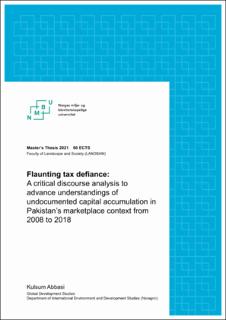| dc.description.abstract | This study problematises the overt, persistent defiance to tax and regulation policy by business communities in Pakistan’s retail marketplaces as a reflection of state-society distance and an expression of power and dominance. This thesis builds on the understanding that the state-society distance, manifested in endemic informal business practices, persists when elite owners of undocumented capital become wedged between the state and society through processes of domination, subjugation and patronage. In seeking to advance understandings of the regime of undocumented capital accumulation legitimating itself as a norm of business activity, this study employs a discourse-analytic viewpoint. Through critical discourse analysis of selected political party election manifesto texts from the election years 2008, 2013 and 2018, the study identifies how consensus of political parties around specific representations of governance normalises aspects of the organisation of society. Additionally, it identifies how representations of social actors imply specific relations of power. The study finds that in representations of governance and in constructions of identity for social actors, conditions conducive to informality are discursively construed. Broadly, these include a valorisation of capital, a subordination of citizens to capital-owners, and a denigration of state institutions. In order to suggest explanations of how the discursive mediates to the manifest aspect of the social context where undocumented accumulation persists barely-resisted, the conceptual lens of ‘embeddedness’ of the social with the economic is utilised. The overarching argument of the thesis is that a logic of social organisation is produced discursively in political party texts, and society is brought into this logic by structural practices such as institutionalised patronage and discriminatory labour laws. This logic of social organisation achieves hegemony in the discursive field that this study has analysed and in the contingent social context, but counter-logics may emerge in other discursive fields, or in non-discursive domains. | en_US |

